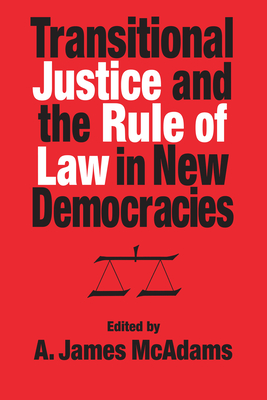

 University of Notre Dame Press
University of Notre Dame Press
Transitional Justice and the Rule of Law in New Democracies


Key Metrics
- A James McAdams
- University of Notre Dame Press
- Hardcover
- 9780268042028
- 9.32 X 6.35 X 1.07 inches
- 1.54 pounds
- Political Science > International Relations - General
- English
 Secure Transaction
Secure TransactionBook Description
This is the first focused study on the relationship between the use of national courts to pursue retrospective justice and the construction of viable democracies. Included in this interdisciplinary volume are fascinating, detailed essays on the experiences of eight countries: Argentina, Bolivia, Chile, Germany, Greece, Hungary, Poland, and South Africa. According to the contributors, the most important lesson for leaders of new democracies, who are wrestling with the human rights abuses of past dictatorships, is that they have many options.
Democratizing regimes are well-advised to be attentive to the significant political, ethical, and legal constraints that may limit their ability to achieve retribution for past wrongs. On prudential ground alone, some fledgling regimes will have no choice but to restrain their desire for punishment in the interest of political survival. However, it would be incorrect to think that all new democracies are therefore bereft of the political and legal resources needed to bring the perpetrators of egregious human rights violations to justice. In many instances, governments have overcome the obstacles before them and, by appealing to both national and international legal standards, have brought their former dictators to trial. When these judicial proceedings have been properly conducted and insulated from partisan political pressures, they have provided tangible evidence of the guiding principles-equality, fairness, and the rule of law-that are essential to the post-authoritarian order.
This collection shows that the quest for transitional justice has amounted to something more than merely a break with the past--it constitutes a formative act which directly affects the quality and credibility of democratic institutions.
Author Bio
A. James McAdams is the William M. Scholl Professor of International Affairs. For 16 years, he was Director of the Nanovic Institute for European Studies. He has also served as chair of the Political Science department. McAdams has written widely on European affairs, especially on central Europe, as well as global communism. His books include East Germany and Detente; Germany Divided; Judging the Past in Unified Germany; and The Crisis of Modern Times.
His book, Vanguard of the Revolution: The Global Idea of the Communist Party (Princeton University Press, 2017 and 2019), examines the political history of the party from the 1840s to the present. Covering a panoply of communist parties from Germany to Russia, China, Poland, North Korea, Cuba, and many others, the book is the first comprehensive international history of the communist party. Vanguard of the Revolution was named one of the Best Books of 2018 by Foreign Affairs. He has recently published two collections: 1968: Cultural Revolutions in Europe and Latin America (with Anthony Monta) and Contemporary Far-Right Thinkers and the Future of Liberal Democracy (with Alejandro Castrillon).
McAdams is the recipient of honorary doctorates from the Catholic University of Ukraine and the John Paul II Catholic University of Lublin, as well as the Gold Medal of the Catholic University of Slovakia.
McAdams has taught courses at every level of the curriculum. These include undergraduate seminars on "Privacy and the Internet," "Ten Images of Hell in the Twentieth Century,” and “Truth, Politics and Democracy”; lecture courses on Comparative Politics and the history of Communism; and a graduate seminar on "Philosophy and Dictatorship." He has won teaching awards across the university, including the Sheedy Award of the College of Arts and Letters, the Madden Award of the First-year of Studies, the Kaneb Award, the Kellogg Institute Mentorship Award, and the Joyce Teaching Award (twice).
Source: University of Notre Dame Department of Political Science
Videos


Community reviews
Write a ReviewNo Community reviews